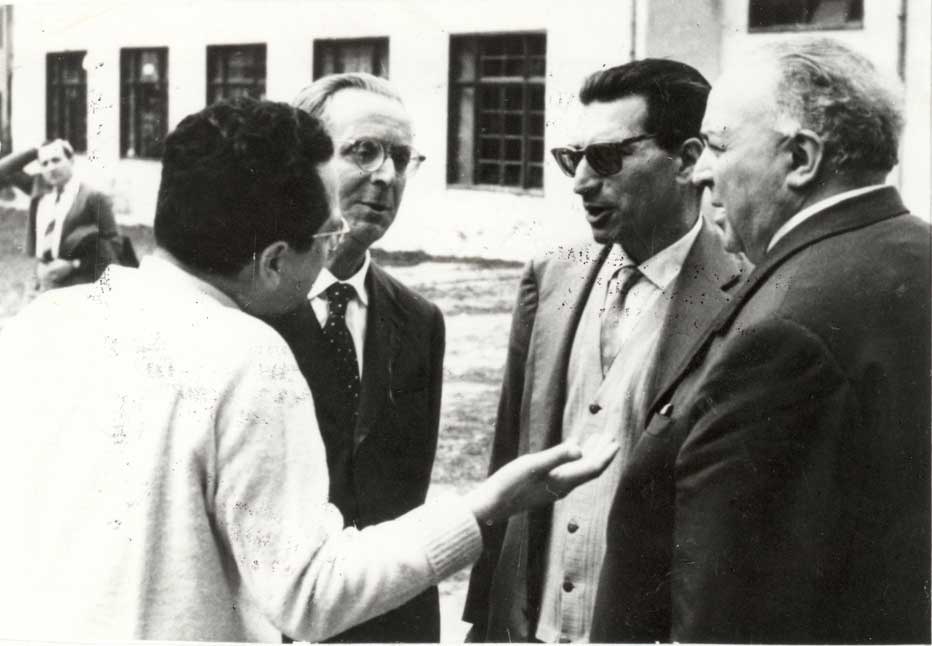
From the Italian Parliament to the world. This part of Igino Giordani’s journey began in the late forties when Igino had reached a rather problematic point in life. To the world he was a Christian intellectual, a brilliant expert on the Fathers of the Church, a writer and Catholic apologist who was always in line with the Church. But he began to experience ‘a certain boredeom of the soul.’ His encounter with Chiara Lubich, foundress of the Focolare Movement, awakened his faith and his love.
Their meeting was extraordinary and so were the circumstances surrounding it. Igino Giordani was a 54 year-old man with 4 grown children. Chiara was a young woman of less than half his age, who was requesting an appointment with him to discuss finding an apartment flat in the city of Rome.
Former member of the Constituent Assembly, Giordani was also a memeber of the Christian Democratic Party, one of those historical members because he was among the first of the 1920s to work for the nascent People’s Party, of Christian inspiration and founded by the priest Luigi Strurzo.
Chiara was a young laywoman and their meeting was taking place well before the Second Vatican Council, at a time when it wasn’t common that a laywoman would be recognised as having some sort of role in the Church.
Yet, despite the large differences between them, that meeting with Chiara completely transformed Giordani and from that moment on he strove to bring the Ideal of Unity into politics. Its announcement took place during a parliamentry session in which ideological differences were quite strong. It was March 16, 1949 when the North Atlantic Treaty was at stake.
“Just when I had known Chiara for a few months,” Giordani recounts, “there was a discussion in the House about the North Atlantic Treaty, and two blocs were formed: one that was headed by America, the United States; and one that was headed by Russia. They were paving the way to make a new war, a masssacre, the definitive war. I remember how very angry we were that night in the House; I was afraid someone was going to pull out a gun and beginshooting; there was much hatred between the two groups.
I had asked to speak and, just before I spoke, a Catholic deputy sat beside me, Mr Pacati. So he said to me: ‘Let’s keep Jesus in our midst, now, as you talk.’ I took the floor. Silence began to fall upon the previous noise and shouting. In the end, the House seemed to have become a church; there was perfect silence as I expressed the ideas that we learn in our Movement; namely, that war serves no good; war is the greatest stupidity; war only serves death. We don’t want war, we want life and life lies in love, in seeking agreement. (. . .)
All of us must react, from whatever part of the country, from whatever political party or faith, because beneath all the tears, beneath all the ugliness accumulated from the war and mud-slinging, it all really comes down to rediscovering the human face, which reflects the face of God.” The parliamentary stenographer concludes his account of that discussion by describing the applause that reached Giordani from all sides of the Chamber.
Soon, numerous parliamentarians joined Igino, desiring to follow the ideal of unity. We name only a few: Gaetano Ambrico, Palmiro Foresi, Tarcisio Pacati, Enrico Roselli, Angelo Salizzoni e Tommaso Sorgi, who became the main biographer of Giordani. With them, Giordani did things that went against the social and political climate of those days. For example, in 1951, together with 40 other parliamentarians – liberals and republicans, social democrats and Christian democrats – he worked for an “Interparliamentary Understanding for the Defense of Peace”
Always moving against the tide, in the midst of the Cold War, in 1949, he and the Socialist, Mr Calosso, promoted the first law on conscientious objection. Imagine the problems that arose when Giordani presented their proposal to the House! But his convictions were like steel: to kill the human being who is made in the image and likeness of God, is to commit deicide.
A new civic consciousness has been born,” Giordani wrote, “one that undoes the divisions of party and faction, current and privileged caste, race, and class. As it spreads, it surpasses national borders. The communitarian impluse that is aroused by Christian love and pushes to the point of incorporating Jesus is a religious and social awakening that, if successful, and we believe it shall be, will change the history humankind.”
Of course, to proclaim the ideals of love and communion in today’s politics seems extremely reckless, but it was even more reckless in Giordani’s times. Yes, Giordani lived within the prophecy; and while taking on the challenges of his times with deep seriousness and commitment, he never became entrapped by them.
He lived the prophecy of a great Ideal, the Ideal of unity, supported by the modern and compelling spirituality of Chiara Lubich who had brought it into the world; and it became the life of Giordani’s politics.
Alberto Lo Presti (Director of the Igino Giordani Centre)